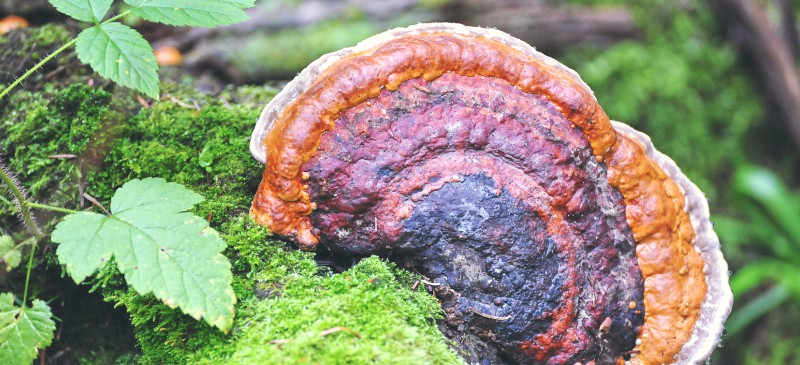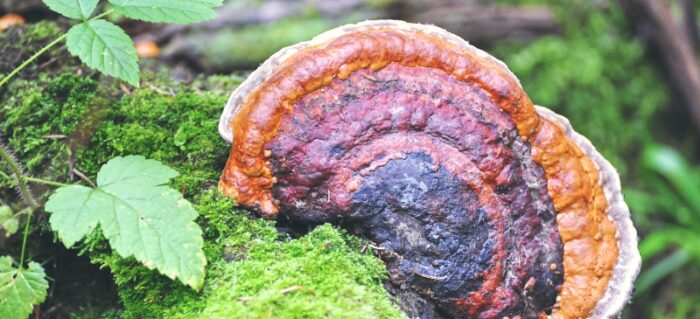The Amazing Powerhouse: Chaga Mushroom


- Cancer treatment and prevention
- Immunol Stimulation
- Inflammation
- Intestinal Health
- Lower Blood Pressure
The Chaga Mushroom, Inonotus obliquus, is an antioxidant powerhouse that grows on birch trees throughout the northern hemisphere and also goes by the names birch conk, cinder conk and clinker polypore. It resembles a dark clump of dirt with bright orange tissue and is used as a folk remedy in Russia and other northern European countries to treat various ailments and diseases, including cancer. Chaga mushrooms are edible but because of their bitter taste, most people drink chaga mushroom as a tincture, extract or tea.
The health benefits of Chaga can be attributed to the abundance of nutrients found within interior of the mushroom, as well as in the outer bark. This nutrient-dense oxidizing superfood is rich in a wide variety of vitamins, minerals, and nutrients, including B-complex vitamins, vitamin D, potassium, rubidium, cesium, amino acids, fiber, copper, selenium, zinc, iron, manganese, magnesium, calcium.
Chaga can fight against free radicals, inflammation, aging skin caused by oxidative stress and inflammation related to chronic conditions such as rheumatoid arthritis. But it may also help regulate the production of the chemical protein messengers called cytokines. These proteins play a vital role in stimulating the white blood cells that defend our immune system. And recent research suggests that some conditions, including depression and autoimmune conditions, that are not normally considered inflammatory, may be partially attributed to chronic inflammation.
The key to healing with chaga is proper extraction, correct mushroom dosage and daily long-term use.
Cancer Prevention & Control
Several studies have found that substances present in chaga may effectively prevent cancer and slow tumor growth. One study showed that an extract of chaga mushroom inhibited the growth and promoted the death of colon cancer cells. Yet another study suggested that chaga mushrooms may be beneficial in the development of anticancer drugs, though these studies need further human research to confirm the effectiveness of using chaga to fight or prevent cancer.
Immune System
Beta-D-glucans, found in Chaga Mushrooms, help balance your immune system by stimulating your immune system when needed; and calming it when it is overactive.
Reduce Inflammation
Cytokines in your body, such as tumor necrosis factor alpha, TNF, are responsible for inflammation. Think of the white blood cells that make TNF as an army that alerts the defense units in your body, tells them where to go and what to do. Betulinic acid, inotodial, and ergosterol peroxide are all compounds in Chaga that help reduce inflammation by inhibiting the production of these cytokines.
Intestinal Health
Chaga mushrooms may help prevent stomach ulcers, due to substances found in chaga that may prevent H. pylori bacteria from growing by interrupting bacterial cell communication.
Lower Blood Pressure
Researchers found that inflammation caused by oxidative stress may contribute to high blood pressure. Chaga’s antioxidant properties may help combat oxidation and lower blood pressure.
Chaga and Blood Thinners
Chaga may interact with blood thinners, such as warfarin or clopidogrel. Some studies suggest that chaga extract may add to the effects of your blood thinner. Always discuss with your healthcare provider before consuming chaga if you take other medications.
Diabetes Medication
Researchers have discovered compounds in chaga mushroom extract that can potentially lower blood sugar. If you are taking diabetes medication or medication to lower your blood sugar, do not use chaga without first discussing with your pharmacist or healthcare professional.
Kidney Disease
Chaga is high in oxalates. Oxalates bind to calcium during digestion and are eliminated in the stool. Any oxalate not attached to calcium goes through the kidneys and leaves in the urine. If there is too much oxalate and not enough water in the urine, the oxalates may form into kidney stones.

Comments are closed here.